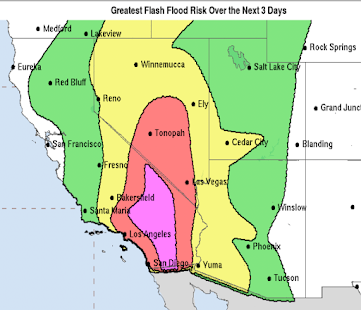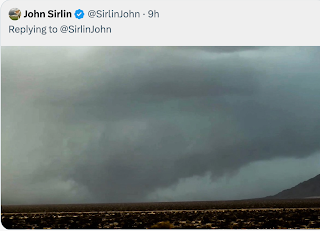Roger Pielke, Jr. on the Hurricane Sandy Mess
Dr. Roger Pielke, Jr., a science and policy specialist at the University of Colorado, has weighed in on the post-Sandy mess. His entire piece is well worth reading. I wish excerpt a point Roger makes about unprecedented (in meteorology) political interference post-Sandy:
US Senator Charles Schumer, a Democrat, sent a letter to NOAA (the parent agency of the NHC) reminding them of the political consequences of their storm categorization. He expalined why to a local radio station:
When President Bush was in office, politicians trying to influence scientific outcomes was bad. Now, it must be okay since even Republicans are doing it:
In New Jersey Governor Chris Christie, a Republican, issued an executive order defining Sandy as a post-tropical cyclone, invoking the NHC re-categorization:
Here is an innovative idea: Politicians should allow scientists to do their work. Christie and Schumer (eight days before an election when Sandy made landfall) were trying to improve their political standings by forcing insurance companies to collect the much smaller ordinary windstorm (as opposed to hurricane) deductibles. But, it is quite possible that this effort to strong-arm NOAA into keeping Sandy a non-hurricane when it made landfall will have major negative long-term effects. Those are two-fold,
1. Insurance companies base their rates on loss experience. If they are forbidden by politics to collect the hurricane deductibles when it is legitimate to do so everyone's rates will go up and/or insurance in coastal areas will be harder to obtain in the future.
2. While not unanimous, I have spoken to several hurricane specialists, including one at the National Hurricane Center, who at this time,* believe Sandy was a hurricane at landfall. If so, the lack of hurricane watches and warnings was a major and unprecedented failure of our warning system. In some areas, the hurricane warnings for 2011's Hurricane Irene were too dire. The NHC warnings for Sandy were not dire enough (go here and view tape at the bottom). The "non-hurricane" warnings caused politicians and emergency officials to give wrong advice (see here and here) that likely cost people their lives.
Social science tells meteorologists, over and over, that people will not react properly to storm warnings if they are getting confused and/or inconsistent messages.
We are doing a wonderful job of confusing them about Sandy.
* Each of them caution their opinions are preliminary pending the post-season review of all of the data collected the day Sandy made landfall.
US Senator Charles Schumer, a Democrat, sent a letter to NOAA (the parent agency of the NHC) reminding them of the political consequences of their storm categorization. He expalined why to a local radio station:
“Today, we’ve sent a letter to NOAA, the weather agency, as well as to the insurance companies that we’re looking over their shoulder. We want NOAA to keep this classified as a tropical storm and to save homeowners in New York and Long Island thousands of dollars and we don’t want the insurance companies to play any games.”A few years back, when politics-science issues were more fashionable, there might have been outrage from scientists and other observers at the idea of a US Senator "looking over the shoulder" of a federal science agency and telling it how to make a scientific judgment. But I digress.
When President Bush was in office, politicians trying to influence scientific outcomes was bad. Now, it must be okay since even Republicans are doing it:
In New Jersey Governor Chris Christie, a Republican, issued an executive order defining Sandy as a post-tropical cyclone, invoking the NHC re-categorization:
In light of the National Weather Service’s categorization of Sandy as a post-tropical storm, it shall be a violation of N.J.A.C. 11:2-42.7 for any insurer to apply a mandatory or optional hurricane deductible to the payment of claims for property damage attributable to Sandy.
Here is an innovative idea: Politicians should allow scientists to do their work. Christie and Schumer (eight days before an election when Sandy made landfall) were trying to improve their political standings by forcing insurance companies to collect the much smaller ordinary windstorm (as opposed to hurricane) deductibles. But, it is quite possible that this effort to strong-arm NOAA into keeping Sandy a non-hurricane when it made landfall will have major negative long-term effects. Those are two-fold,
1. Insurance companies base their rates on loss experience. If they are forbidden by politics to collect the hurricane deductibles when it is legitimate to do so everyone's rates will go up and/or insurance in coastal areas will be harder to obtain in the future.
2. While not unanimous, I have spoken to several hurricane specialists, including one at the National Hurricane Center, who at this time,* believe Sandy was a hurricane at landfall. If so, the lack of hurricane watches and warnings was a major and unprecedented failure of our warning system. In some areas, the hurricane warnings for 2011's Hurricane Irene were too dire. The NHC warnings for Sandy were not dire enough (go here and view tape at the bottom). The "non-hurricane" warnings caused politicians and emergency officials to give wrong advice (see here and here) that likely cost people their lives.
Social science tells meteorologists, over and over, that people will not react properly to storm warnings if they are getting confused and/or inconsistent messages.
We are doing a wonderful job of confusing them about Sandy.
* Each of them caution their opinions are preliminary pending the post-season review of all of the data collected the day Sandy made landfall.




Comments
Post a Comment